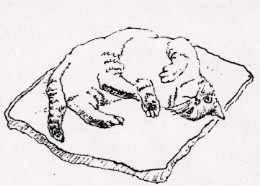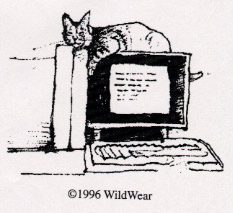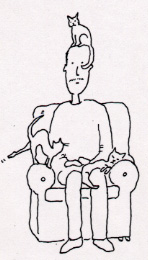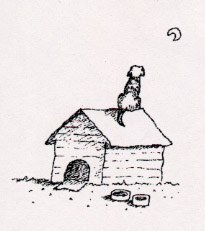![]()
snips
dog/cat sitter tips... 
spay/neuter
/
tips / greyhounds
/ quotes
/ stories
/ books
/ links
/ happily ever
afters / mission
/ get in touch
/ home








What
Your Sitter Needs to Know
1. In order to schedule visits, your sitter will need to know the important routines in your companion animal's day -- medication, eating, sleeping, walking or playing times.
2. List all the major and minor health problems your companion animal may have with detailed information on medications.
3. Providing your sitter with a letter from you stating the amount that may be spent on emergency care is a great safeguard. Let your vet know your wishes as well.
4. Leave your vet's phone number.
5. To avoid a hysterical call, be sure that all companion animals are where they are supposed to be when you leave. If the cat(s) sneaks out before you leave, be sure to inform your sitter so he/she doesn't spend most of the visit crawling around under your furniture.
6. It does help if your sitter knows where your companion animal's favorite hiding places are.
7. Your sitter needs to know of any unusual habits your companion animal may have (such as eating habits, fears, the desire to ambush the sitter's ankles, etc.).
8. Be sure your animal's collar fits properly and that both dogs and cats have (does it go without saying?) current identification tags.
9. Leave current photos of your animal. This could be a lifesaving tip in the event your companion animal is lost or stolen: Your sitter would be able to post notices immediately, not wasting precious time. Also, tell your sitter if your companion is tattooed or microchipped, and give her all the necessary information.
10. Leave everything needed for the care of your companion animal in one general area so your sitter doesn't have to go through your drawers and cabinets looking for leashes, food, bowls, and, especially, medicine.
11. Let the sitter know where cleaning supplies are kept (trash bags, mops, rags, buckets, paper towels, cleansers, broom, dust pan,vacuum), and where to throw trash and/or used kitty litter.
12. Tell the sitter where favorite toys are kept. Remove any personal items that may be in danger of becoming chewies. Even if your dog does not normally chew, the stress of your being gone may prompt some "security blanket" issues.
13. If you don't have an extra key to your house, you will need to have one made for the sitter before you go away. Make sure that the key works!
14. Arrange for a neighbor to have another key to your home in case of emergency.
15. Be sure to leave your sitter the name and number of this neighbor.
16. Inform neighbors who may be looking out for your property that a sitter will be taking care of your animals.
17. Make sure you tell your sitter if anyone else has permission to enter your home or property while you are gone.
18. Provide your itinerary and all numbers where you can be reached, including your cell phone. Make sure to let the sitter know as soon as any changes occur in your plans.
19. Make sure to call your sitter when you arrive home, or she may be in your kitchen feeding your cat the morning after you return.
Safety
Is Critical
Don't hide
keys outside.
Make sure outside gates to a dog lot or swimming pool are closed.
Make sure all the doors and windows are locked.
Set
indoor heating/cooling thermostat. Leave instructions for setting the thermostat.
Unplug any appliances that won't be used to prevent damage during electrical storms or injury to companion animals.
Consider leaving a radio on while you're away. It could be a crime deterrent and may also keep your companion animal company.
Don't leave anything out that could be harmful to your companion animal. This includes but is not limited to: strings, dental floss, ribbon, fish hooks, needles, antifreeze, fertilizer and other household poisons. Remember, an animal who is bored or lonely is much more likely to investigate areas he normally wouldn't.
Never leave your companion animal in a garage unless you have companion animal-proofed the area -- including providing means for heating or cooling the area and removed all poisonous substances.
Make sure your clothes dryer is closed - kitties love to curl up in dryers, and yours could accidently get locked inside.
We
Also Recommend
Provide some written verification
of up to date vaccinations for your companion animal.
If your dog is not used to walking on a leash, you should practice with him before leaving.
Leave some piece of clothing that you have recently worn near where your companion animal sleeps to "remind" him or her of you.
Move valuables away from windows and put away bikes, outdoor toys and lawn furniture that can be easily stolen.
If your sitter will be visiting in the evenings, a light on a timer keeps her from walking into furniture. Most sitters will not charge extra for this, but your companion animal could be frightened by her screams.
Let your sitter know if there are any rooms that are "off limits" for companion animals and sitters.
Leave a list of numbers that may be helpful in any emergency: vet, electrician, plumber, maid service, yard or pool maintenance, etc.
Let your sitter know the location of your fuse box or circuit breaker and where to find new fuses.
Plan
Ahead
Call to make your reservations
as early as possible -- especially during the holidays.
Buy extra food, litter and supplies in the event your absence is longer than you had anticipated.
Make
sure your yardwork is done.
Other
Services
If plants are to
be watered, tell your sitter where they are located and how often and how much
they should be watered.
Lights
can be turned on in the evening and off in the morning and curtains can be opened
and closed. Just leave instructions.
Your sitter can pick up your newspapers and mail, too. Tell her where you would like her to leave them.
